John Kasich Resisting Calls To Drop Out of Republican Race For President
Ohio Governor John Kasich cannot win a majority of delegates at this point, but he's still resisting calls to drop out of the race.
As the Republican establishment continues to line up behind Ted Cruz as what is allegedly their last, best hope to stop Donald Trump, Ohio Governor John Kasich is continues to reject calls to drop out of a race that seems to be unwinnable from his point of view:
Republicans desperate to stop Donald J. Trump from capturing the presidential nomination increased the pressure Wednesday on Gov. John Kasich of Ohio to quit the race, with Jeb Bush joining the growing number of party figures throwing their weight behind Senator Ted Cruz.
Mr. Kasich refused, saying that he, not the Texas senator, was the best option to stop Mr. Trump. But his argument was undercut by his dismal showings Tuesday in Utah and Arizona, where he won no delegates — as well as by the surprise endorsement Wednesday morning by Mr. Bush of Mr. Cruz.
Mr. Bush, who dropped out of the presidential race last month, is the latest mainstream Republican — following Mitt Romney and Senator Lindsey Graham — who is ideologically closer to Mr. Kasich, but whose embrace of Mr. Cruz is a strategic calculation that he has a better shot at stopping Mr. Trump.
In a statement, Mr. Bush called Mr. Cruz a “consistent, principled conservative who has demonstrated the ability to appeal to voters and win primary contests.”
“For the sake of our party and country,” he added, “we must move to overcome the divisiveness and vulgarity Donald Trump has brought into the political arena, or we will certainly lose our chance to defeat the Democratic nominee and reverse President Obama’s failed policies.”
Mr. Cruz himself pressed the issue Wednesday, a day after his resounding victory in Utah, where he won 69 percent of the vote, making him the first Republican candidate to win a majority in any state.
Mr. Trump took Arizona, while Mr. Kasich finished with even fewer votes there than did Senator Marco Rubio of Florida, who dropped out last week after early voting had begun.
“If this were a head-to-head race, a direct head-to-head race between me and Donald, I would feel very confident that we would get to 1,237,” Mr. Cruz said, citing the number of delegates needed to clinch the nomination before the July convention. “The complicating factor is John Kasich. It is unclear if Kasich will bleed off just enough votes to give Trump victories and delegates in states he would not otherwise have won.”
Mr. Kasich ignored all calls to step down. He campaigned Wednesday in Wisconsin, where the next Republican primary will be held April 5, and his advisers argued that the race’s final stretch of 20 states, mostly in the Northeast, Middle Atlantic and the West Coast, put Mr. Kasich in a far stronger position than Mr. Cruz to halt Mr. Trump.
“When we get to Pennsylvania, we get to New Jersey, Connecticut, Rhode Island — let me tell you, I drop out, Donald Trump is absolutely going to be the nominee,” Mr. Kasich said. “I don’t believe that Senator Cruz can come to the East and win.”
Charlie Black, a strategic adviser for Mr. Kasich, echoed the theme, stressing that moderate Republicans dominate in most of the remaining states, not those who identify as “very conservative” or evangelical, who have been Mr. Cruz’s base of support.
Mr. Kasich has won just one contest, Ohio, his home state. In the Northeast, he nearly beat Mr. Trump in Vermont, and came in second to Mr. Trump in Massachusetts and New Hampshire. But Mr. Cruz won Maine, where Mr. Kasich was a distant third.
As I noted yesterday, Kasich has already been mathematically eliminated from being able to win a majority of the delegates to win the nomination and he will only stand to lose ground to Donald Trump and Ted Cruz as time goes on over the next three months. His campaign doesn’t appear to deny this fact, though, and instead insists that he is the only only candidate who can compete against Trump in the contests going forward, especially in the Mid-Atlantic states that have primaries at the end of April, as well as states such as New Jersey and California, which don’t have primaries until June but which seemed destined to play a far more prominent role in the selection of the Republican nominee than they have in quite some time. At least superficially, it’s an argument that makes some sense given the fact that the Republican electorate in these states is likely to be less conservative than in other parts of the country, meaning that a candidate like Ted Cruz is less likely to do well in those states and that a one-on-one matchup against Trump in those states between Trump and Cruz would likely help Trump more than it does Cruz. There hasn’t been nearly enough polling in the April primary states to be able to state with any certainty whether Kasich’s campaign is right or not. The only thing we can say with certainty is that Kasich has absolutely no chance of winning the nomination before the convention, and that his only remaining role is as a spoiler in the effort to stop Donald Trump.
Underlying all of this, of course, is the suspicion that Kasich is playing the long game here in the hope that it will benefit him in the end while Trump and Cruz continue to bloody each other up. The most unlikely scenario has the Ohio Governor suddenly becoming a consensus compromise pick for President at a deadlocked Republican convention, and that Kasich can use his win in Ohio as well as, his campaign hopes, strong performances in the Mid-Atlantic and California, to make the case that he is better situated to take on Hillary Clinton in the fall. As further evidence in support of this argument, Kasich and his supporters frequently point out that Kasich is the only candidate who consistently beats both Bernie Sanders and Hillary Clinton while head-to-head polling shows Ted Cruz losing to both candidates, and Donald Trump doing even worse. Notwithstanding those numbers, though, it seems highly unlikely that Kasich would end up walking out of Cleveland as the nominee even in the case of a brokered convention. Another theory has Kasich perhaps being able to use the 250 or so delegates he’s likely to control as a bargaining chip for a place on the ticket. This isn’t an entirely implausible explanation for Kasich’s actions, but given the fact that both Cruz and Trump are likely to lose to the likely Democratic nominee one wonders why Kasich would consider it to be to his advantage to be the running mate on a losing ticket, something that has rarely been the stepping stone to political success in the United States.
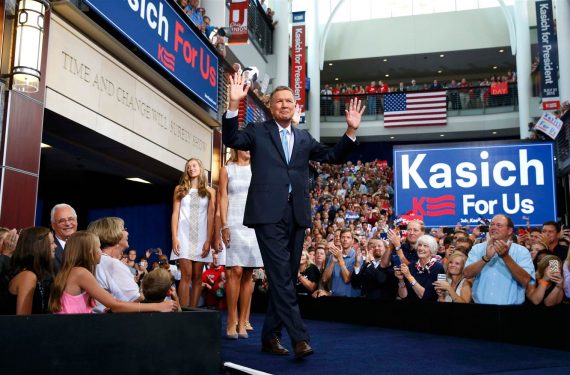

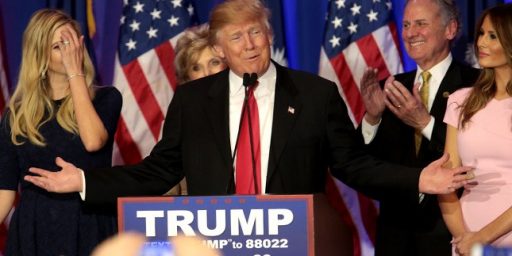
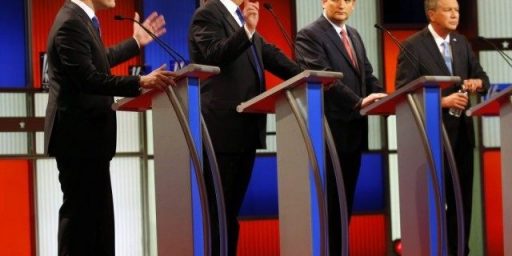
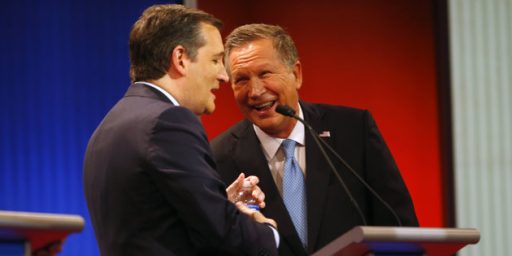

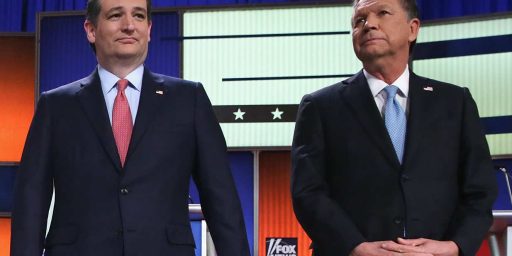
I am not sure why there is an assumption that all of Kasich’s supporters would automatically shift over to Cruz, making him more competitive. Each time someone has dropped out thus far, the votes seem to redistribute among the remaining candidates rather than just benefiting one candidate or another. Were Kasich to drop out, my hunch is some supporters would go to Cruz, some would go to Trump, and some would probably decide to sit it out or vote in the D primary (if that’s an option in their state).
It’s entirely possible that Kasich dropping out would actually accelerate Trump’s chances, allowing him to get to 1237 more quickly.
I do think Kasich is playing for a spot on the ticket as VP, or, less plausibly, being the choice of a contested convention–or simply trying to force a contested convention. For all three of those possibilities, it makes more sense for him to stay in than get out. The only real question is, does he have the money to stick around?
Republicans cannot run Trump, or Cruz and they know it.
Jimminy…Trump has lower favorables than even Congress.
Kasich is the only one poised to win when the ultimate crack-up comes in Cleveland later this year.
There has been a bunch of talk about Ryan in the last couple weeks…but he didn’t help Romney.
By sticking around he puts down his claim to be the leader of the GOP in the event of a defeat in this year’s elections. Cruz will be tainted as a loser either to Trump or Hillary. The other contenders quit rather easily. Not even the Republican Party will nominate Trump a second time. I doubt that Kasich is spending his own money, and Ohio is not very charming this time of year. The GOP leadership can not scare him out with the threat of their displeasure; look at their handling of the process so far. Nothing to lose, lots to win.
@Slugger: Except that if he acts as a spoiler for this year’s election, is he really going to be supported next time around?
Or is it that the Establishment republicans hate both Cruz and The Donald so much that they’re perfectly happy to trash both their chances and let Hillary sweep the boards (given that they think they can work with her)?
(This all reminds me of a description John Dickson Carr had about a certain type of detective story writer: “lady waltzers”)
Kasich is an establishment Republican. The other remaining candidates are not, and the GOP establishment doesn’t like either one of them.
If the establishment can end up with a brokered convention, then it will attempt to craft a new ticket without either Trump or Cruz in the lead position. That becomes a bit easier if Kasich is still in the game, even if he isn’t the one who ends up as the preferred establishment nominee. At this juncture, his role is to serve as a foil on behalf of the party establishment.
What they don’t want is some sort of Trump-Cruz unity ticket, which is a lot more likely if they are the only two left standing.
@Jen: I largely agree with you. And somewhere yesterday I saw some polls that say the same about either Kasich or Cruz dropping out – their votes would mostly get split between Trump and the other guy, but with a slight bias towards Trump.
My instinct is that both staying in will result in a better chance of a contested convention, but I don’t think the data clearly proves that to be true or false.
And finally, my *preference* would be for Kasich to stay in, but no Republican is going to listen to me.
Cruising the internet this morning, I encountered the Twitter exchange between Trump and Cruz regarding their wives. Can anyone support having either of these childish boors as the head of their party? I remind people that the USA makes a genuine claim to leadership in many areas and that the GOP has a very important role in our country. Mr. Priebus, please do your job.
No link on purpose; there is some scum that I don’t want in my search history.
@Jen: Too lazy to look, but I seem to recall someone in a thread a day or two ago citing polling that Trump is the second choice for both Kasich and Cruz voters. So if the goal is to get a majority for Cruz, Kasich dropping out probably hurts Cruz. If the goal is to stop Trump and throw the convention open, then Kasich should stay in.
A fourth possibility is that Kasich is trying to set up a run in ’16. As long as he has money, why not?
Everybody is talking about a brokered convention. I take “brokered” to mean the party fathers step in and negotiate a deal. Are there such people anymore? I’m realizing that if there’s no first ballot winner, this isn’t brokered, it’s a free-for-all. Every campaign for itself and delegates shopping for bids. And if Trump comes in with a reported majority, that’s not enough for a first ballot win. I’m starting to see reporting on how much rat fracking can be done around seating delegates, at the local, state, and Cleveland level.
@Jen:
@C. Clavin:
@Pch101:
The current rules (e.g., Rule 40) permit only Trump and (possibly) Cruz to be entered for a vote. Between them, these two will have enough (loyal) delegates to prevent said rules from being changed.
The interviews with delegates and rules committee members I have seen indicate strong preference for nominating someone who has faced the voters with some success.
Thus, Ryan/Kasich/DarkHorse/etc. look pretty unlikely – it will be Trump or Cruz.
@Slugger: The weather in Ohio has been really nice this March. And our Gov. Kasich is Scott Walker with 20 more IQ points and better patter. He’s a founder of ALEC and a bankster. So I’m happy to see him busied elsewhere.
@gVOR08:
Even if Trump only gets 1200 or so delegates, there will be a lot, maybe 200 or more unpledged delegates for him to try to persuade to support him.
@charon:
Yes, but the Rules Committee meets the week or so prior to the convention, to set the rules for this year. Quoting existing rules assumes that those will be the rules in play, that is not a guarantee.
I don’t disagree that it will likely be Trump or Cruz, and I still think that Trump is well on his way to securing 1237 prior to the convention. All I was getting at is that IF the idea is to prevent Trump from getting to 1237 before Cleveland, the only way that is really possible is if Kasich stays in.
@gVOR08:
Re: “Brokered” convention–it sort of drives me a bit crazy when people say “brokered convention”–we don’t use party brokers anymore, at least not to my knowledge. The correct terminology is to refer to it as a contested convention, but I am a bit more of a stickler for proper usage than the average Joe.
@charon:
Rule 40 can be amended or repealed. The drama that would surround the effort to do that would be entertaining; Rule 40 was intended to help the establishment, not to hand the reins to an outsider.
I’m not sure the Republican establishment is even lining up behind Cruz — he got a couple of endorsements lately, including Jeb(!), but it’s too soon to say that this is a turning point. People really don’t like Ted Cruz.
We’ve seen the Doom Of Trump prognosticated far too often to take it as a done deal until we see something pretty concrete.
@Pch101:
Did you miss the part I pointed out the votes to do that are likely to not be there?
@Jen:
I think he comes up short, maybe he can still win on the first ballot by fishing in the unpledged delegate pool.
Here is Larry Sabato’s take , which I regard as overly optimistic for Trump getting to 1237:
http://www.centerforpolitics.org/crystalball/articles/assessing-trumps-path-to-1237/
There are all kinds of peculiarities in the state rules if you dig into them. For example, some of Rubio’s delegates (just a few) become unbound if only one name is entered for a vote. I’d guess there are others, not something I have researched though.
@charon:
Rules and Republicans in the same context…that’s so precious.
I mean…don’t get me wrong…I’d love to see Republicans nominate a fool like Trump. I just can’t see it actually happening.
Kasich is hoping for two things to happen
1.) no clear convention majority
2.) all polls show Cruz can’t beat Hillary 1:1
Then he can call himself the best candidate that actually run in the primaries, to beat off “outsiders” like Romney or Ryan.
I tend to see conservatives as not very creative. But boy howdy, when it comes to cheating, can’t beat them for creativity. I think it comes from paying hundreds of lawyers to pore through every line of the rules.
@C. Clavin:
Gee willikers…they appointed a friggin’ President instead of following the rules.
@C. Clavin: W was fairly elected. 5 to 4.
@gVOR08:
+1
Don’t see any incentive for Kasich to drop out – what is his payoff?
Staying in, maybe more delegates can be traded for some payoff?
Meanwhile, OT, Trump maybe doesn’t do too badly fishing in the unbound delegate pool:
http://www.buzzfeed.com/christophermassie/trump-backing-congressman-many-members-are-supporting-trump#.pw72EYebv
With the rest of America that has already calculated that mathematically Kasich can not outright win the nomination, I conclude that either his calculator is malfunctioning or someone is filling him with a ton of b.s.
One problem I see with the anti-Trump brigade is that it isn’t at all unified and consists of several sub-groups whose interests are at odds with the others. There are, for one thing, the right-wing Cruz backers like Erick Erickson. Then there are the “establishment” Republicans who think Cruz is just as awful as Trump, if not more so. Many of the anti-Trumpists still hold out hopes they can somehow maneuver a non-Trump candidate to victory and still beat Hillary in the fall; others are more or less resigned to losing the presidential election and are simply hoping to minimize the damage as much as possible (to downballot races in particular).
Since they can’t even agree what exactly they’re trying to accomplish other than stop Trump from becoming the GOP nominee, it’s hard to see how they could ever coordinate a strategy together.
CNN poll has Trump and Kasich virtually tied in Pennsylvania, 33% to 30%, within the poll’s margin of error.
Not only is there no incentive for Kasich to get out of the race, a good chunk of voters–at least in Pennsylvania–don’t seem to care that he has no mathematical chance of securing the nomination.
@Jen: Yep. I’m in PA. The fact that the only thing he can do is keep Trump from reaching 1237 is feature not a bug.
@Jen: Actually the evidence does show that Cruz gets a majority of the votes from a candidate that drops out.
@Adam:
Where? National polls? Specific locations?
Most big states left to come are Northeast or West Coast, I do not see much Cruz enthusiasm in the Northeast. CA – who knows?
@charon:
The latest polls show Trump is leading in California.
Predictions:
1. Kasich will not win another state ( maybe Pennslyvania, but that’s doubtful).
2. Cruz will win interior Western states like Montana and Wyoming, and lose everywhere else.
3. Trump will win the 1,237 delegates outright.
Beyond that, the crystal ball grows cloudy :-).
@Adam: “Majority of” is not the same as “all”–which was my point.
No one candidate has exclusively benefited from others dropping out. Kasich’s voters are comprised of potentially three sets of people: those who support Kasich, those who hate Trump, and those who hate Cruz. We have no idea what the percentages in those categories are. If Kasich drops out, some of his voters will go to Cruz, some will go to Trump, and a percentage will sit it out or go muddle around the Dem race (if they can). Since Trump already is winning contests, the number of voters that would go to him would potentially push him higher, getting him to the nomination more quickly. There is almost zero chance that 100% of Kasich’s voters would go to Cruz.